Category: Longform
You are viewing all posts from this category, beginning with the most recent.
17 Years
Seventeen years ago, on a sweltering Friday night in Charlotte, NC, two youngsters stood before God and a few hundred friends and family and made promises that they surely didn’t fully understand.

In some ways it feels like it was just yesterday… until I start thinking about all the intervening events. 17 years later we’ve added three kids, cycled through about half a dozen cats, have a lot less hair, and still play church softball every season. (This year’s team’s infield: two married couples. One husband/wife at short and second; Becky at first and me at third. Such fun… until I start airmailing my throws to first!)
God has been good to us, and we keep learning every day (or at least most days) how to love each other better and become even better friends. Today is our seventh prime number anniversary, and here’s to another 10 or 12 primes before we’re done.

A little early-morning band action
I play with a band called Standing Before Giants off and on. (I don’t show up on the official band info, but they pull me in for gigs on a semi-regular basis. It works.) On Sunday we’re playing at Praise on the River - a fundraiser for the local free medical clinic.
To publicize things this morning we played a 30-minute acoustic set on the stage at the local Farmer’s Market. Nothing like having to be tuned up and ready to sing at 7:30 am!
If you’re around Cedar Rapids tomorrow (Sunday June 21), come down to the amphitheater and listen to the music! Full band mode will be engaged for that one (i.e. I’ll have my keyboard with me!).

Photo credit to the estimable John Walton.
A little bit of a bozo
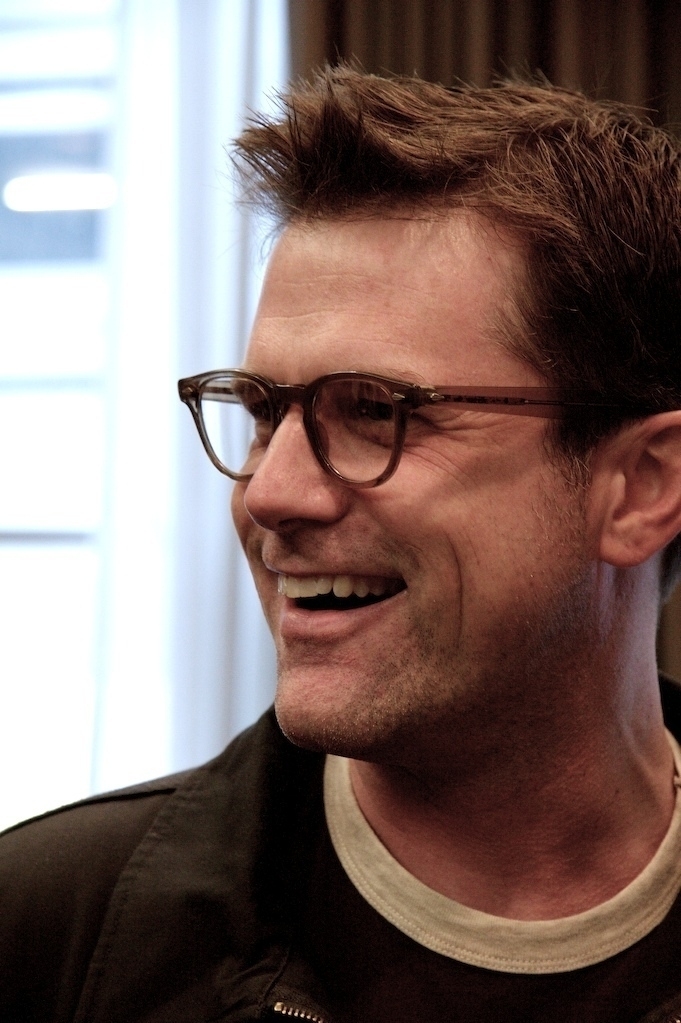 My theme in any discussion over the past couple of years has usually come around to “well, yeah, but… it’s complicated.” So my head started nodding enthusiastically yesterday when listening to the Reconcilable Differences podcast, when I heard Merlin Mann say this about the possibility that he’s a contrarian (at about 22 minutes into the episode):
My theme in any discussion over the past couple of years has usually come around to “well, yeah, but… it’s complicated.” So my head started nodding enthusiastically yesterday when listening to the Reconcilable Differences podcast, when I heard Merlin Mann say this about the possibility that he’s a contrarian (at about 22 minutes into the episode):
What a lot of people get and that some people don’t get is that you’re not trying to be difficult, but that the more you enjoy something the more you’re interested in seeing how it could be better. And here’s a thing that’s actually not such a big deal that you could make better. It’s not an insult, it’s not a slam. And for me, whenever people say “oh you gotta to out and set goals for yourself”, I’ll be “well, maybe”. You know goals can really be self-defeating if they aren’t updated and realistic. “Oh you should never have goals.” Well, that’s not true. Do you really wanna play tennis without a net? I feel like maybe I’m more of a contrarian? I feel like, whenever somebody comes up with something that’s, like, an unvulnerable pronouncement about how the world mostly always is, it gets my dander up a little bit, and I don’t feel like I have to say something, but I know I’m thinking that person’s probably a little bit of a bozo.
Preach, brother Merlin. Preach.
That old, old impulse to tweak and re-write
As a worship leader I confess I grumble from time to time about the current propensity of our songwriters to appropriate and revise classic hymns in ways that just drive me crazy.
For example, my worship pastor has heard me rant on more than one occasion about Chris Tomlin’s modification of the last verse of Crown Him With Many Crowns. The original lines directly address Jesus:
All hail, Redeemer, hail, for Thou hast died for me, Thy praise and glory shall not fail throughout eternity…
But Tomlin, for some reason that doesn’t entail the rhyming scheme, revises the words to talk about Jesus rather than to Him:
All hail, Redeemer, hail, for He has died for me, His praise and glory shall not fail throughout eternity…
Why, Chris, why? You could’ve modernized the language without screwing around with the perspective of the song. Argh.
Oh, and don’t even get me started about the multiple Christian-ese re-writes of Leonard Cohen’s “Hallelujah”. Yikes.
OK, I’ll get off my soapbox.
This past weekend we had a garage sale, and among 3 big boxes of sheet music my Mom brought to the sale, I found a book that lets me know that this isn’t a new problem.
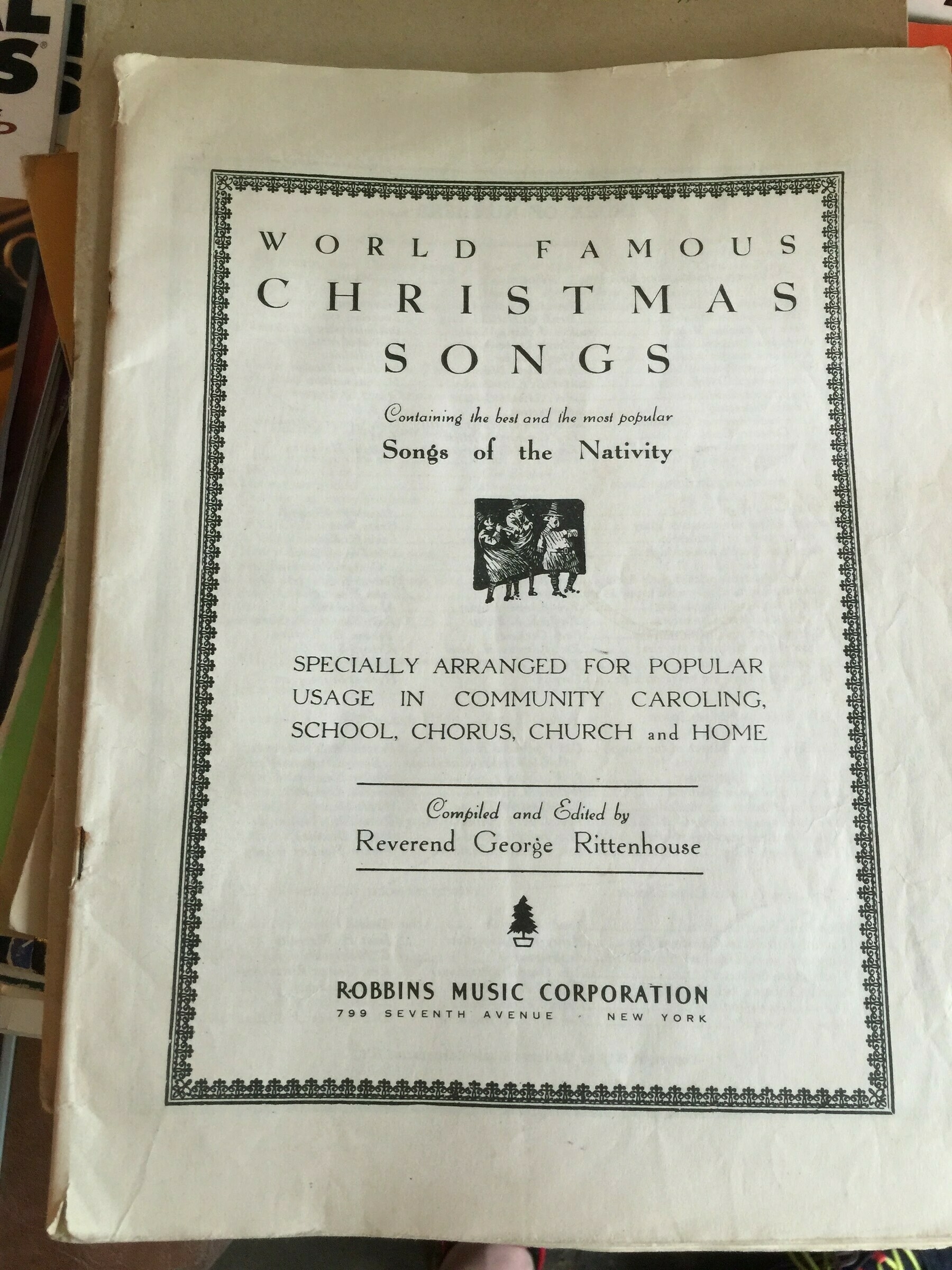
“World Famous Christmas Songs, containing the best and most popular Songs of the Nativity”. Compiled and Edited by the Reverend George Rittenhouse. Published in 1929, it’s an eclectic assortment of both secular and sacred songs.
What stuck out to me as I paged through was that when it says “edited” by Rev. Rittenhouse, they weren’t kidding. His fingerprints are all over this thing.
For instance, he rather ambitiously chooses to re-harmonize Angels We Have Heard on High with some extra movement:
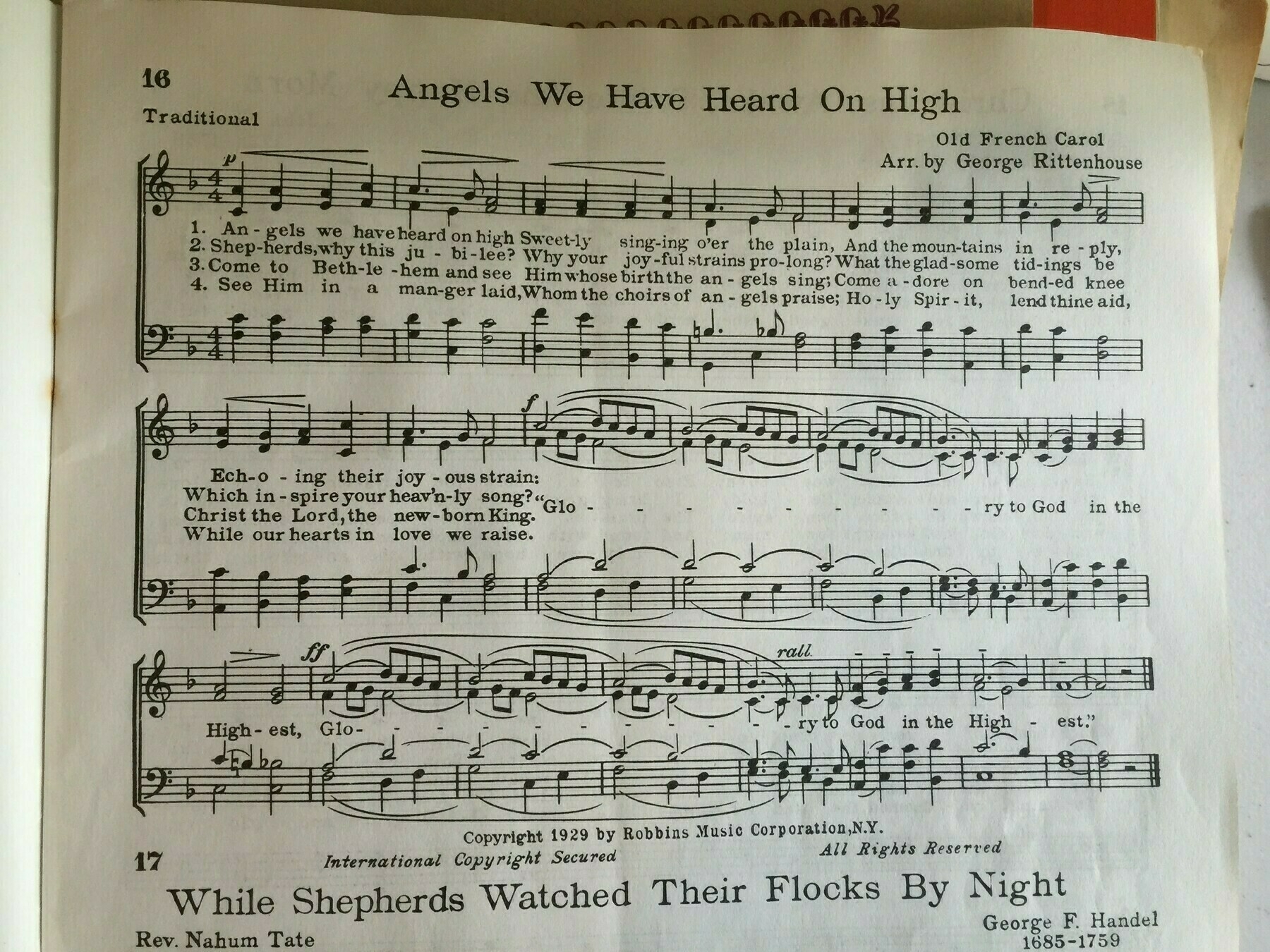
Another place he appropriates Bizet’s L’Arlessienne and some old lyrics to create a rather bombastic tune subtitled “The March of the Kings”.
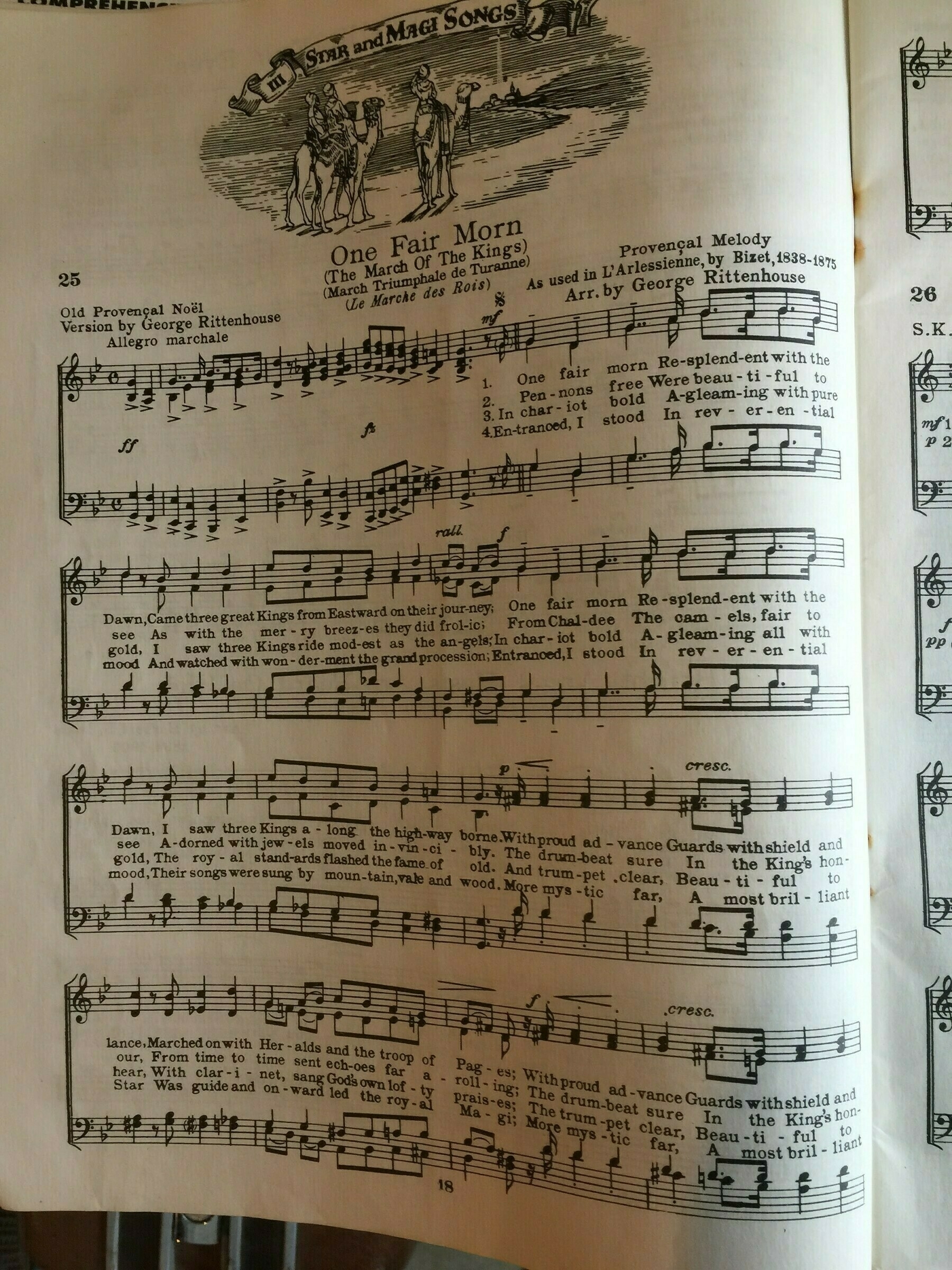
Then there’s this gem, wherein he re-writes the lyrics of “O Tannenbaum!” to give them a Christian angle:
O Christmas Tree! Fair Christmas Tree! A type of Life Eternal! O Christmas Tree! Fair Christmas Tree! Your boughs are ever vernal. So fresh and green in Summer heat, and bright when snows lie round your feet O Christmas Tree! Fair Christmas Tree! A type of Life Eternal!
A classic waiting to happen, right there. There are two more verses if you’re really interested.
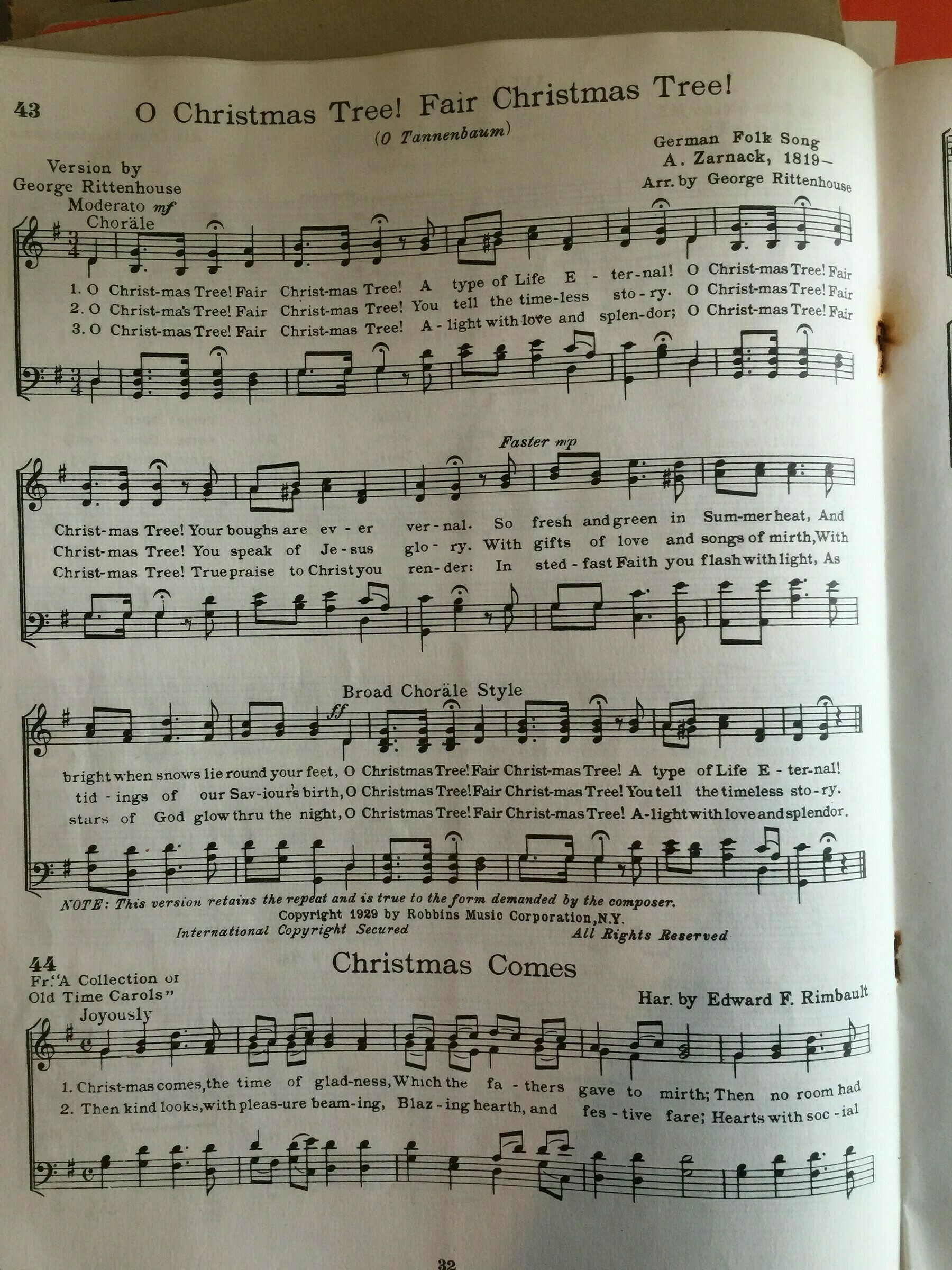
The more things change…
I guess I shouldn’t be surprised that these impulses have been around a long time. (Picture a musician in the court of King Hezekiah - “gah, why can’t we just sing that psalm the way King David wrote it?”) But it was comforting to see that confirmation, and to be reminded that history has a way of weeding out the material of lesser quality and holding on to the good stuff.
I guess I can be patient.
May I go through the day calling on you
A beautiful prayer, credited only as an “Ethiopian Prayer”, from today’s noon-time reading in Phyllis Tickle’s The Divine Hours:
God, you have prepared in peace the path I must follow today. Help me to walk straight on that path. If I speak, remove lies from my lips. If I am hungry, take away from me all complaint. If I have plenty, destroy pride in me. May I go through the day calling on you, you, O Lord, who know no other Lord.
Amen.
A Meal Shared Among Friends
I’ve had the sacraments (especially the Eucharist) on my mind lately after reading James K. A. Smith’s Desiring the Kingdom, and then listening to the On Being podcast this morning I found this bit from Father Greg Boyle, a delightful Jesuit priest who has spent his life working with gang members in Los Angeles:
Jesus doesn’t lose any sleep that we will forget that the Eucharist is sacred; He is anxious that we might forget that it’s ordinary, that it’s a meal shared among friends, because if we don’t see that, then we’ll be unable to recognize the sacred in the ordinary, and that’s the incarnation.
Interesting to hear from a Catholic. But in my experience, this is a trap we Evangelicals have fallen into at various times, too.
Infrastructure and the Common Good
Adam Gopnik in The New Yorker last week:
What we have, uniquely in America, is a political class, and an entire political party, devoted to the idea that any money spent on public goods is money misplaced, not because the state goods might not be good but because they would distract us from the larger principle that no ultimate good can be found in the state. Ride a fast train to Washington today and you’ll start thinking about national health insurance tomorrow.
My family just returned from a two-week vacation road trip that took us through Illinois, Indiana, Tennessee, Kentucky, North Carolina, and Alabama before returning home. You notice things while driving for days.
While in Tennessee we stopped at a state park built around a Tennessee Valley Authority dam that was built in the 1930s as a part of the New Deal and is still going strong. (I had no idea the TVA system of electrical generating dams was as big as it is.)
 [Norris Dam, commissioned in 1936.]
[Norris Dam, commissioned in 1936.]
The only way our road trip was possible was thanks to the massive Interstate Highway system kicked off in the 1950s. So beneficial to be able to drive between major cities at fast speeds without having to slow down for each town. But many of the roads were in bad condition, with a minimum number of apparent ongoing repairs.
While in North Carolina we saw the news of the terrible Amtrak crash, in a Philadelphia neighborhood familiar to my mother-in-law, not far from where she used to live.
While in Alabama we visited the US Space and Rocket Center. We marveled at the almost indescribably huge Saturn V rocket and pored over displays detailing the US space program from the 1960s to the space shuttle and Skylab in the 80s and 90s to… well, not much today.
So…?
It seems obvious to me that the days of infrastructure spending are past, and that seems like an increasing problem. Sure, it’s easy to say “the government is the problem, not the solution” when you do your taxes and have to figure out the tax code that even the IRS doesn’t really understand.
But if the government isn’t going to maintain the roads, who is? Does anybody really think we’d be better off without the federal Interstate Highway system, or without the TVA’s utilities? Thousands of commuters use the train system every day, helping ease the strain (and pollution) of car commutes. Should we hope somehow that private enterprise will fund those repairs and infrastructure investments?
It’s enlightening to spend a few minutes looking at the Federal Government spending breakdown over on the National Priorities Project. Of a nearly $4 trillion federal budget, a full two-thirds of it is commitments to Social Security and Medicare.
Then here’s how the remaining third breaks down:

It’s striking to me how small a fraction is spent on infrastructure-type things. The entire budget for transportation, energy & environment, and science is only 8% of discretionary spending. We spend seven times as much on the military as we do for highways, airways, power, environmental protection, and space combined.
This is not workable for the United States in the long term. Regardless of our party affiliation, we should recognize that the government is at its best when it is pooling resources for the common good. And from my vantage point in the driver’s seat of a minivan these past couple weeks, there’s a lot of good that needs to be done if we could just agree to make it a priority to do it.
Formation of the Heart
I’m working my way through Jamie Smith’s Desiring the Kingdom, and he is driving home the point that it’s not just our minds that need formed, but our hearts. He argues that humans are not, at a base level, thinkers, but lovers. As such, Christians need to be concerned not just with education, but with formation of our practices and desires. I’m sure I’ll have more thoughts later, but this quote stuck out today:
Unfortunately, the church often adopts a … misguided strategy: while the mall, Victoria’s Secret, and Jerry Bruckheimer are grabbing hold of our gut (kardia) by means of our body and its senses - in stories and images, sights and sound, and commercial versions of “smells and bells” - the church’s response is oddly rationalist.
It plunks us down in a “worship” service, the culmination of which is a forty-five-minute didactic sermon, a sort of holy lecture, trying to convince us of the dangers by implanting doctrines and beliefs in our minds.
While the mall paradoxically appreciates that we are liturgical, desiring animals, the (Protestant) church still tends to see us as Cartesian minds. While secular liturgies are after our hearts through our bodies, the church thinks it only has to get into our heads. While Victoria’s Secret is fanning a flame in our kardia, the church is trucking water to our minds. While secular liturgies are enticing us with affective images of a good life, the church is trying to convince us otherwise by depositing ideas.
Hmmmmm…
Too much knowledge about the Bible a bad thing?
In a recent update of Christianity Today’s Leadership Journal they interviewed Josh McDowell about, among other things, current trends on the belief in the inerrancy of the Bible. Here’s how the first bit went:
Q: Trust in the inerrancy of Scripture, even among some evangelicals, has waned in recent years. Why do you think this is? There is no one reason. I think one of the major reasons is the information glut on the Internet. The Internet is so gigantic. It has leveled the playing field. Atheists and agnostics have such ready access to our kids. It didn’t use to be this way. Now, information—good and bad—is just one click away. Pastors, youth pastors, professors, and others are being confronted with deep theological, philosophical, and historical challenges to the Scriptures that no one would even hear about until their fourth year at a university. Believers are being confronted with so many opposing positions on the Scriptures—issues the majority from past generations simply didn’t confront. This has tended to undermine people’s belief system. That is why we need to redouble our efforts to communicate biblical truth.

"Gutenberg Bible" by Raul654. Licensed under CC BY-SA 3.0 via Wikimedia Commons.
I think McDowell’s point is valid, but I’m a little disturbed about what it seems to imply. If I were to boil the Q&A down, the reasoning might go like this:
- “Trust in the inerrancy of Scripture” is waning. This is bad.
- This is happening in large part because Christians have more information than they used to have.
- If Christians having this information causes a bad result… maybe Christians shouldn’t have this information?
Now, McDowell doesn’t go fully there - he says that we just need to try even harder to communicate biblical truth - but I get wary any time I hear an argument that says the problem was caused by people knowing too much.
If you have an argument that you’re fully confident is true, shouldn’t you welcome the fact that people want to understand more about the Scripture, where it came from, how God uses it, and so on? If there are “deep theological, philosophical, and historical challenges to the Scriptures”, shouldn’t Evangelical leaders be addressing them head-on rather than decrying their broader availability?
Am I overreacting here?
I’m a bit put off by the phrase “trust in the inerrancy of the Scripture”. Of all the things Christians are called to trust in, that’s not one of them.
It seems likely to me that Evangelical leaders have often briskly asserted “inerrancy” as a linchpin for maintaining beliefs about other things (young-earth creationism, homosexuality, complementarianism, etc, etc) either without fully teasing out the difficult nuances of what “inerrancy” means, or (more likely) without dealing with the reality that many preachers will teach on “inerrancy” without any appreciation for those nuances.
Generations of Christians before may have gone through life without ever really stopping to think about what “inerrancy” meant, but as the internet broadens our social and intellectual horizons, the right response isn’t to decry that broadening, but to teach with more detail and nuance what we mean by the word.
For those of you still reading this post who are getting concerned about me putting the word “inerrancy” in quotes: I believe that the Bible is God-breathed, and profitable for doctrine, correction, reproof, instruction, etc. I also agree with John Piper’s nuance of “without error in the original manuscripts”, given his understanding of “error” [emphasis mine]:
A writer is in error when the basic intention in his statements and admonitions, properly understood in their nearer and wider context, is not true.
The Benedict Option (i.e. Christian Cultural Withdrawal)
Rod Dreher has been championing an idea he calls The Benedict Option - as he describes it, “a limited, strategic withdrawal of Christians from the mainstream of American popular culture, for the sake of shoring up our understanding of what the church is, and what we must do to be the church”
Alan Jacobs spins things in a slightly different direction:
So I wonder if a better way to think about the Benedict Option is not as a strategic withdrawal from anything in particular but a strategic attentiveness to the institutions and forms of life within which Christians can flourish.
It’s some interesting reading, even if Dreher can be rather dour. But I really like what Jake Meador has to say about it today over at Mere Orthodoxy.
…perhaps the issue isn’t that the culture has moved away from the faith, but that the faith’s adherents have moved away from it along with the culture–and as the culture we’ve attached ourselves to becomes progressively more antagonistic to orthodoxy we are simply becoming aware of the distance that has opened between the faithful and traditional orthodoxy. We’ve been riding along with the culture even when we shouldn’t have and we’re just now beginning to realize where that ride has taken us.
While there will always be some who feel called to a more significant strategic withdrawal from the culture, Meador’s analysis seems close to the mark. Maybe withdrawing from the culture isn’t something special for this time and era so much as it is a call out from a culture to which we’re far too drawn in. Certainly worth some reading and thought.
